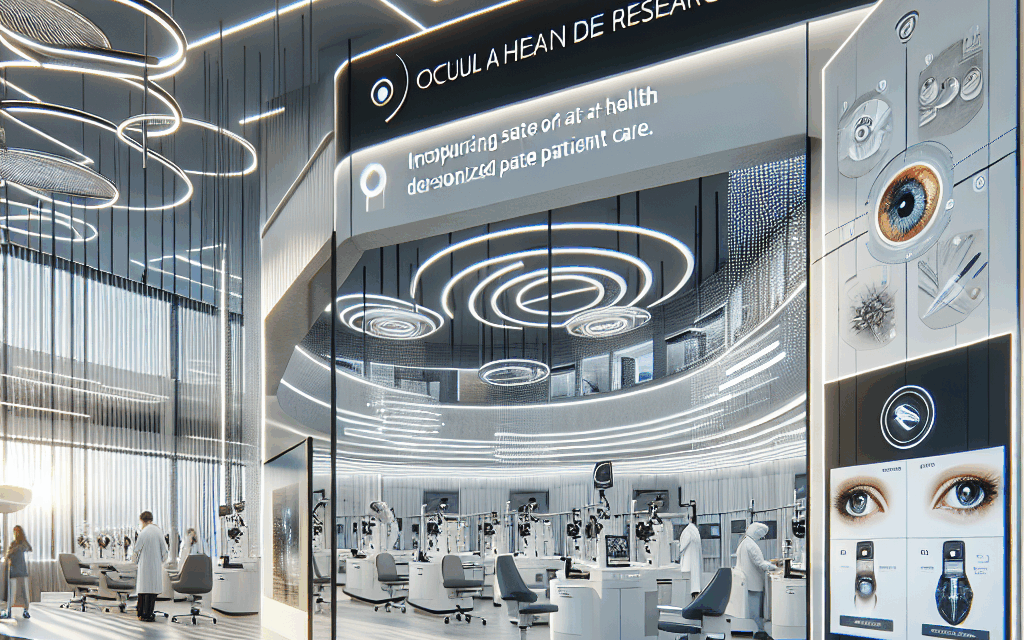Exploring the Benjamin Eye Institute: Merging Cutting-Edge Technology with Tailored Care
The Benjamin Eye Institute stands at the forefront of ophthalmic care, combining advanced technology with personalized treatment plans to enhance patient outcomes. This article delves into the various aspects of the institute, exploring its innovative approaches, state-of-the-art technology, and commitment to individualized care. We will cover five key subtopics: the institute’s history and mission, the latest technological advancements in eye care, personalized treatment plans, patient success stories, and the future of ophthalmology at the Benjamin Eye Institute.
1. The History and Mission of the Benjamin Eye Institute
The Benjamin Eye Institute was founded with a vision to provide exceptional eye care through a blend of advanced technology and compassionate service. Established by Dr. Benjamin, a renowned ophthalmologist, the institute has grown from a small practice into a leading center for eye health, attracting patients from across the globe.
The mission of the Benjamin Eye Institute is to deliver comprehensive eye care that prioritizes patient comfort and satisfaction. The institute aims to educate patients about their eye health while providing cutting-edge treatments tailored to individual needs. This commitment to excellence is reflected in their approach to both clinical care and patient education.
Over the years, the institute has expanded its services to include a wide range of ophthalmic specialties, including cataract surgery, glaucoma management, and retinal care. The team at the Benjamin Eye Institute comprises highly skilled ophthalmologists, optometrists, and support staff who work collaboratively to ensure the best possible outcomes for their patients.
One of the key milestones in the institute’s history was the introduction of laser-assisted surgeries, which revolutionized the way eye conditions are treated. This advancement not only improved surgical precision but also significantly reduced recovery times for patients. The institute continues to invest in research and development, ensuring that it remains at the cutting edge of ophthalmic care.
2. Latest Technological Advancements in Eye Care
The Benjamin Eye Institute is dedicated to integrating the latest technological advancements into its practice. This commitment is evident in the array of state-of-the-art equipment and techniques employed to diagnose and treat various eye conditions.
Some of the most notable technological advancements include:
- Optical Coherence Tomography (OCT): This non-invasive imaging technique provides high-resolution cross-sectional images of the retina, allowing for early detection of conditions such as macular degeneration and diabetic retinopathy.
- Laser-Assisted Cataract Surgery: Utilizing femtosecond laser technology, this procedure enhances the precision of cataract removal and lens implantation, resulting in improved visual outcomes and faster recovery times.
- Retinal Imaging Systems: Advanced imaging systems enable detailed visualization of the retina, facilitating accurate diagnosis and monitoring of retinal diseases.
- Telemedicine: The institute has embraced telemedicine to provide remote consultations, making eye care more accessible to patients who may have difficulty traveling to the clinic.
- Artificial Intelligence (AI): AI algorithms are being integrated into diagnostic processes, helping to analyze imaging data and predict patient outcomes more accurately.
These technological advancements not only enhance the accuracy of diagnoses but also improve the overall patient experience. For instance, the use of OCT allows for earlier intervention in diseases that could lead to vision loss, ultimately preserving patients’ sight and quality of life.
Moreover, the institute’s commitment to continuous education ensures that its staff remains proficient in the latest technologies. Regular training sessions and workshops are conducted to keep the team updated on emerging trends and techniques in ophthalmology.
3. Personalized Treatment Plans: A Patient-Centric Approach
At the Benjamin Eye Institute, personalized treatment plans are a cornerstone of patient care. The institute recognizes that each patient is unique, with individual needs and preferences that must be considered when developing a treatment strategy.
The process begins with a comprehensive eye examination, during which ophthalmologists assess the patient’s vision, medical history, and lifestyle factors. This thorough evaluation allows the medical team to identify specific eye conditions and tailor treatment options accordingly.
Some key elements of personalized treatment plans include:
- Customized Surgical Options: For patients requiring surgery, the institute offers a range of options tailored to their specific conditions. For example, patients with cataracts may choose between traditional surgery and laser-assisted techniques based on their preferences and medical history.
- Multidisciplinary Care: The institute often collaborates with other specialists, such as endocrinologists for diabetic patients, to ensure a holistic approach to treatment that addresses all aspects of a patient’s health.
- Patient Education: Patients are actively involved in their treatment decisions. The institute provides detailed information about various treatment options, potential risks, and expected outcomes, empowering patients to make informed choices.
- Follow-Up Care: Personalized treatment does not end with the initial procedure. The institute emphasizes the importance of follow-up care, scheduling regular check-ups to monitor progress and make any necessary adjustments to treatment plans.
This patient-centric approach has proven effective in improving patient satisfaction and outcomes. By considering individual preferences and circumstances, the Benjamin Eye Institute fosters a collaborative environment where patients feel valued and engaged in their care.
4. Patient Success Stories: Transforming Lives Through Vision Care
The impact of the Benjamin Eye Institute extends beyond clinical outcomes; it profoundly transforms the lives of its patients. Numerous success stories highlight the institute’s commitment to restoring vision and enhancing quality of life.
One notable case involved a patient named Sarah, who had been struggling with cataracts for several years. Her vision had deteriorated to the point where everyday activities, such as reading and driving, became increasingly challenging. After a thorough evaluation, the team at the Benjamin Eye Institute recommended laser-assisted cataract surgery.
Post-surgery, Sarah experienced a remarkable improvement in her vision. She was able to return to her favorite hobbies, including painting and gardening, which she had previously abandoned due to her declining eyesight. Sarah’s story is just one of many that illustrate the transformative power of advanced eye care.
Another inspiring example is that of John, a diabetic patient who developed diabetic retinopathy. Through regular monitoring and timely intervention at the Benjamin Eye Institute, John’s condition was managed effectively. The team utilized OCT imaging to track changes in his retina, allowing for early treatment that preserved his vision. John now participates in community outreach programs to raise awareness about diabetes and eye health, sharing his journey to inspire others.
Statistics further underscore the institute’s success in improving patient outcomes. According to internal data, over 95% of cataract surgery patients at the Benjamin Eye Institute report significant improvements in their vision within weeks of the procedure. Additionally, follow-up surveys indicate that patient satisfaction rates consistently exceed 90%, reflecting the institute’s dedication to quality care.
5. The Future of Ophthalmology at the Benjamin Eye Institute
As the field of ophthalmology continues to evolve, the Benjamin Eye Institute remains committed to staying ahead of the curve. The future of eye care at the institute is characterized by ongoing innovation, research, and a focus on patient-centered care.
One area of growth is the integration of artificial intelligence in diagnostic processes. The institute is exploring AI algorithms that can analyze imaging data more efficiently, potentially leading to earlier detection of eye diseases. This technology could revolutionize how conditions like glaucoma and macular degeneration are diagnosed and treated.
Additionally, the institute is investing in research initiatives aimed at developing new treatment modalities. Collaborations with academic institutions and industry partners are underway to explore novel therapies for conditions such as age-related macular degeneration and retinal diseases.
Telemedicine is also expected to play a significant role in the future of eye care at the Benjamin Eye Institute. The COVID-19 pandemic accelerated the adoption of telehealth services, and the institute plans to expand its telemedicine offerings to enhance accessibility for patients, particularly those in remote areas.
Furthermore, the institute is committed to community outreach and education. By hosting workshops and seminars, the Benjamin Eye Institute aims to raise awareness about eye health and preventive measures, empowering individuals to take charge of their vision.
Conclusion
The Benjamin Eye Institute exemplifies the successful merger of cutting-edge technology and personalized care in the field of ophthalmology. Through its commitment to innovation, patient-centered treatment plans, and a focus on education, the institute has transformed the lives of countless individuals facing vision challenges.
As we look to the future, the Benjamin Eye Institute is poised to continue leading the way in eye care, embracing new technologies and methodologies that enhance patient outcomes. The stories of patients like Sarah and John serve as powerful reminders of the impact that dedicated care and advanced treatments can have on individuals’ lives.
In summary, the Benjamin Eye Institute not only provides exceptional eye care but also fosters a culture of compassion and collaboration, ensuring that every patient receives the tailored care they deserve. As advancements in technology and research continue to unfold, the institute remains committed to its mission of preserving and enhancing vision for all.





